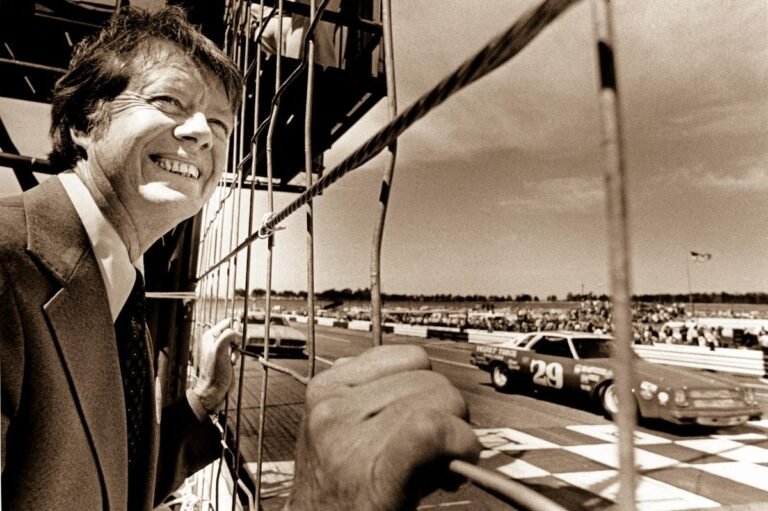Remembering Jimmy Carter: More than a President
The recent passing of President Jimmy Carter has left a profound impact not only on the nation but also on the hearts of those who cherished his multifaceted personality. The 39th president of the United States was far more than just the man who held the highest office in the land. He was a farmer, a southern gentleman, a devoted humanitarian, and, surprisingly to some, a passionate racing fan. As tributes poured in, many remembered his unique character and hobbies, including a cherished family tradition that revolved around the 12 Hours of Sebring race, held in Sebring, Florida. Memories of his time at the racetrack with his beloved wife, Rosalynn, serve as a warm reminder of the intimate and joy-filled moments they shared together.
Racing Behind the Wheel: A Family Tradition
In a heartwarming clip from an interview conducted by IMSA about a decade ago, Carter fondly recounted his family trips to the 12 Hours of Sebring. He described how he and Rosalynn would make the journey from Georgia, packed not only with the excitement of racing but also with a deep bond that music provided. They would listen to records filled with the sounds of roaring engines—the vibrant noise echoing the adrenaline of the track. On race days, they turned their heads away to challenge each other on their discerning senses, guessing which car would zoom past on the bumpy Sebring surface. This loving tradition highlighted how, for the Carters, racing transcended mere entertainment; it served as a canvas for cherished memories built on love, laughter, and the thrill of competition.
In one of his endearing anecdotes, Carter highlighted the distinct sounds of various cars, comparing the melodic hum of Ferrari and Maserati V10s to the grinding growl of a Chevrolet Corvette’s V8 engine, which he likened to the sound of a John Deere tractor. His nuanced appreciation for the intricacies of racing sounds illustrates his deep connection to the sport. This love for racing was engrained in him from childhood; growing up in the heart of NASCAR country in Georgia, it was a natural extension of his upbringing.
A Geographical Connection to Racing Culture
The affection for racing wasn’t just a pastime for Carter; it was an integral part of his life. Growing up close to Atlanta Motor Speedway, he immersed himself in the world of racing even during his youth, working as a ticket vendor during events when he wasn’t cheering from the sidelines. This background facilitated a bond between him and the racing community that lasted well into his governorship and presidency. While in office, he famously hosted NASCAR legends at the Governor’s Mansion and later welcomed them to the White House, fulfilling a promise made during his 1970 campaign. Such gestures highlighted his genuine admiration for the sport and a commitment to celebrating the culture surrounding it.
While many U.S. presidents have made their interests in sports known, racing rarely receives the spotlight. Brief appearances by presidents or vice presidents at major races occur only sporadically. In contrast, Carter’s engagement was grounded in genuine enthusiasm, and his efforts demonstrated a unique commitment to recognizing and connecting with fans and enthusiasts alike. This passion created a concrete bridge between his political life and personal interests, humanizing him beyond the political stage.
Shared Experiences and Personal Reflection
As I made my own pilgrimage from Michigan to the Sebring racetrack, I found myself reflecting on Carter’s journey. The tens of hours spent driving echoed the same excitement he must have felt during his family road trips to the races. Just like the Carters, who once treasured their time together, I became part of a larger community of racing fans drawn together by our shared passion. Even as I stood trackside, watching the cars speed by, I thought about what it meant to appreciate the power and beauty of these machines.
In my musings, I wondered if I would ever reach the level of expertise that Carter and Rosalynn had in distinguishing cars by their sounds. I pictured the two of them, side by side, grinning as they identified each vehicle with remarkable accuracy. If anything, this relationship with racing reminds me of the bonds our passions can create, transcending generations and personal experiences.
Lessons from a Lifelong Passion
Through reminiscing about his deep love for racing, Carter offers a lens into a life that embraced simplicity amidst complexity. His stories encompass warmth, laughter, and the authentic joys of family. This narrative of racing isn’t solely about high-speed thrills; it’s a testament to how hobbies can cultivate connections among loved ones. In a world often dominated by the seriousness of leadership and governance, Carter’s affinity for car racing humanizes him, showcasing a president who found joy in the little things while navigating the highest of responsibilities.
As we remember Jimmy Carter, it’s important to celebrate the versatility of his legacy. He was not just a leader; he was a compassionate man who connected with people on a personal level. The love he shared for racing reflects a broader theme—how life’s passions can foster unity and encourage simple, joyous moments. Whether crossing state lines for a race or quizzing each other on the sounds of engines, Carter exemplified how a genuine love for something can leave an indelible mark on our lives and the lives of others. Even in his passing, his spirit as a devoted family man and a racing enthusiast lives on, reminding us all of the simple joys that can enrich our lives.



